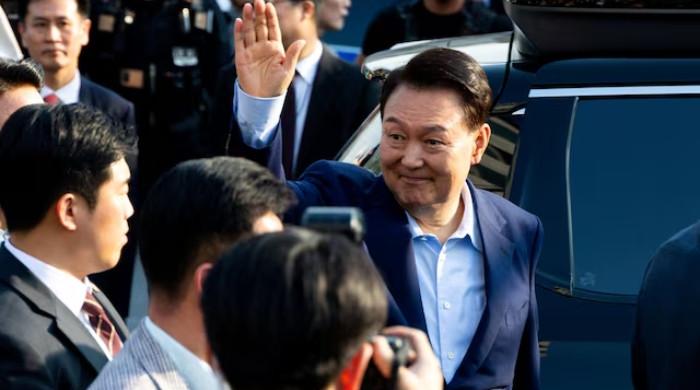SEOUL: South Korea’s former President Yoon Suk Yeol, who was removed from office, appeared in court on Monday to face criminal charges related to an alleged insurrection. He asserted that his declaration of martial law late last year was “not a coup d’etat”.
Yoon’s attempt to impose martial law lasted approximately six hours. It was abandoned due to opposition from parliament and widespread public demonstrations. This action triggered months of unrest and ultimately led the Constitutional Court to remove him from the presidency earlier this month for abuse of constitutional authority.
Yoon, who denies all accusations, arrived at the Seoul Central District Court in a dark navy suit and red tie after departing his residence in a motorcade.
During the initial court session, prosecutors argued that Yoon lacked legitimate grounds for declaring martial law and accused him of attempting to disable key state institutions, including the parliament.
“The defendant … made it impossible for constitutional institutions to exercise their authority based on an unlawful declaration,” the prosecution stated.
Yoon, who previously served as the country’s chief prosecutor before his presidency, defended his actions in court, offering a detailed rebuttal to the prosecution’s claims.
“Martial law is not a coup d’etat,” Yoon stated firmly.
He refuted the claim that he paralyzed the government. He argued that martial law was necessary to inform the public about the opposition party’s obstruction of the government through the impeachment of over 20 officials, which he considered a dangerous situation.
“This was a peaceful ‘message martial law’ to the nation… I knew this martial law would end within half-a-day, a day,” Yoon explained.
Yoon claimed that while he had communicated his intentions to the former defense minister, Kim Yong-hyun, military officials executing the order seemed to have exceeded the intended scope due to their training under different martial law guidelines.
Insurrection Charge
Two high-ranking military officers testified during the afternoon session.
Both officers, including Cho Sung-hyun from the army’s capital defense command, confirmed that they received orders from their superior to deploy troops to forcibly remove lawmakers from parliament during Yoon’s martial law declaration.
Yoon refuted this allegation, asserting that he never issued such an order.
The martial law declaration, which cited the need to eliminate “anti-state” elements, was revoked after parliamentary staff used barricades and fire extinguishers to prevent special operations soldiers from entering the parliament, where lawmakers voted against the measure.
The charge of masterminding an insurrection carries a potential penalty of life imprisonment or even death, although South Korea has not carried out an execution in decades.
The Constitutional Court stated that Yoon’s declaration of martial law on December 3 caused significant disruption across all sectors of society, the economy, and foreign policy when it ruled to remove him from office.
The political crisis has intensified divisions between conservatives and liberals and increased strain on institutions and the military, which struggled with whether to enforce martial law.
Following his departure from the presidential residence on Friday, the former president was greeted by crowds of conservative supporters as he returned to his private home.
Yoon, along with his wife and pets, moved back into their apartment, located near the Seoul court where he previously achieved major legal victories as a prosecutor, including the conviction of former President Park Geun-hye.
He remains resolute and has promised to support his followers. The opposition Democratic Party criticized Yoon on Monday, calling him delusional for not offering a sincere apology.
The country is now scheduled to hold a snap election on June 3. The extent of Yoon’s future involvement remains uncertain.



Comments (0)
No comments yet. Be the first to comment!
Leave a Comment